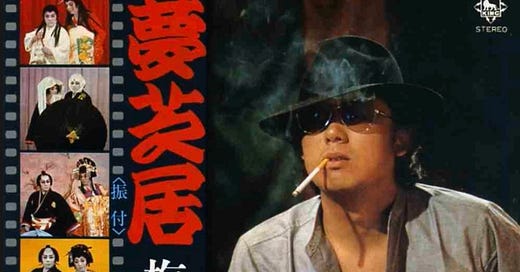This is How to Japanese, a monthly newsletter with something about Japan/Japanese and a dash of いろいろ.
日本・日本語: The dog (犬) eats delicious (旨) grain (禾) as training for the real meal
Language study builds upon itself in the funniest ways. The more you expose, the more you’re able to see and hear, such that it frequently feels like you encounter words in the wild immediately after learning them, when what’s really happening is that you’ve been surrounded by these words all along and just weren’t able to recognize or understand them. It’s humbling.
The latest case of this for me has been the word 稽古 (keiko, lesson/training). IUC uses the “Kanji in Context” textbook, which is a comprehensive look at all 2,136 常用漢字 (Jōyō Kanji, “common use” kanji). (There’s an Anki deck here.) It’s interesting. My thoughts about it are still in flux, but I like it so far. It’s divided up into 156 lessons, and I’m using my summer break to get a head start. I started with Lesson 1 and am spending most of my time working forward, but I thought it might also make sense to slowly work from the back forward, so I’ve been adding kanji from the last few lessons to my study little by little.
The early kanji are all familiar, although I’ve lost the ability to write many of them, but the later kanji include many that I’m not sure I’ve studied. One of these was 稽, and when I saw the definition of 稽古, I immediately thought, I bet that never gets used!
And then this, of course, is the very first scene in the trailer for the documentary “Sumodo: The Successors of Samurai,” which was included as part of Cinema Chicago’s virtual Summer Screenings festival:
This is the ムカデ稽古 (mukade keiko, centipede training), which I believe is self-explanatory.
I’ve also had the 1982 Umezawa Tomio song 夢芝居 (Yume shibai, “Dream Drama”) (PERMASEARCH) on repeat the last couple weeks.
I can’t remember where I discovered it, but I believe I was just letting the YouTube algorithm do its thing after listening to a few enka songs.
I’ll save my comments on Umezawa’s stunningly deep voice, the fact that this song seems to have been both a debut and a one-hit wonder, the interesting note that Umezawa is an 女形 (onnagata), the awesome examples of passive voice and quintessential enka imagery in the lyrics, and the music itself (awesome symphonic swells + 80’s metal + enka) for later. (Also, holy shit, can we talk about everything going on in this 1994 live performance?) For now, I just wanted to share this line from the song:
けいこ不足を幕は待たない
恋はいつでも初舞台
The curtain doesn’t wait for inexperience
Love is always a first performance
Yes, that’s 稽古 right there, just given in hiragana and combined with 不足 (fusoku/busoku, lack/shortage). I love the poetic inversion of the word order in the first line.
There are a number of interesting definitions of 稽古, which are all worth reading, but I think the third definition is the most commonly used:
修業。練習。特に武術、芸能などについていうことが多い。
Training. Practice. In particular, used often for martial arts and the performing arts.
I hope to write more about re-learning to write kanji sometime soon. So far it feels like valiantly trying to spell a difficult English word. The other day I tried to write “conquer” and on my first attempt got to c-o-n-c before backspacing, taking a moment to reassess my life, and then finally writing it out. Training helps, but words will always be hard.
いろいろ
I was in The Japan Times recently with an article about how to make abstract words more concrete. I looked specifically at government/politics and got some fun quotes from a couple friends who are politics experts. I’ll be back on the Bilingual page this coming week as well.
Keep an eye on the website for bonus coverage coming soon as well as my annual Murakami Fest in September.
I also did a 号外 edition of the podcast for new JETs, who are finally starting to leave for their posts, some after waiting for over a year.
I hope you’re all getting vaccinated and supporting places that are requiring guests to be vaccinated. I wish Chicago would go ahead and require it for indoor activities. For now, I’m frequenting places like Metropolitan and Hopewell that are requiring it. For an interesting (and depressing) look at the response to these announcements, see the Instagram announcement posts for Bell’s (Michigan) and 2nd Shift (Missouri).





